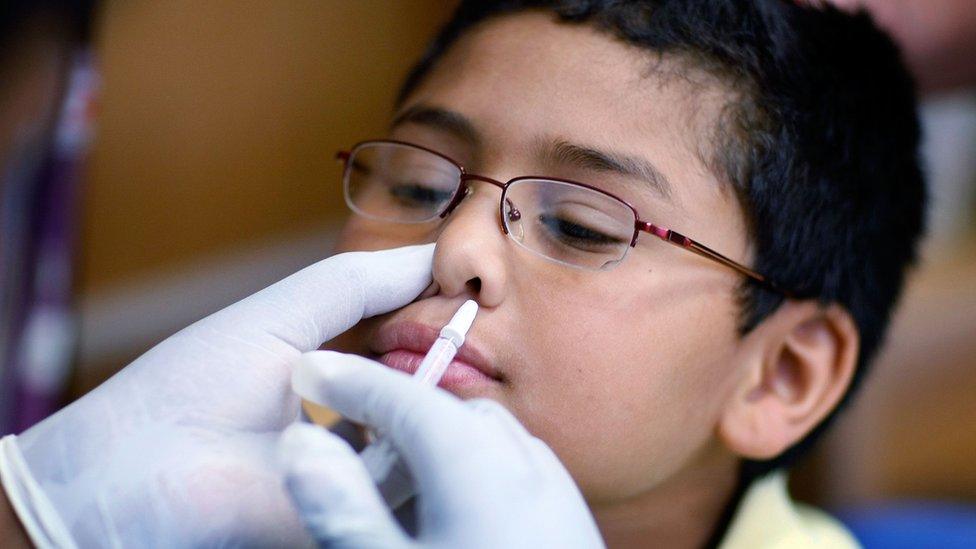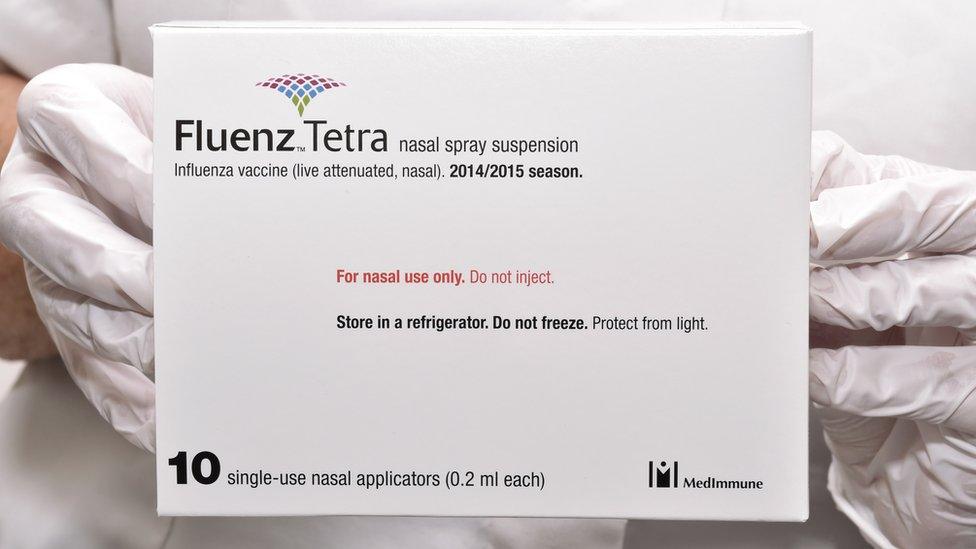Pork gelatine use in NHS vaccines 'disappointing'
- Published

The nasal spray vaccine to protect children against flu contains porcine gelatine
The use of pork gelatine in three vaccines used by the NHS has been branded "disappointing" by the Vegetarian Society.
Chief executive Lynne Elliot added that the use of animal ingredients in medicines is "upsetting".
Porcine gelatine is derived from pigs and used in vaccines against flu, shingles, measles, mumps and rubella.
Public Health England said the gelatine is used as a stabiliser, external and developing an alternative "may never happen".
The government agency said the gelatine is "highly purified" and manufactured under "strict hygiene and safety regulations".
A spokeswoman for Public Heath England said the gelatine helps to keep the vaccine viruses stable "to provide the best protection against flu".
Ms Elliot said there should be "vegetarian and vegan versions of all medicines and vaccines".

Public Health England said the injectable flu vaccine does not contain gelatine but is "less effective"
The three vaccines which contain porcine gelatine are:
Fluenz Tetra - a nasal spray vaccine which protects children against flu
MMR VaxPro - a jab which protects against measles, mumps and rubella
Zostavax - an injection to protect adults against shingles
All three are used across the UK as part of the national immunisation programme.
Zostavax and Fluenz Tetra were first introduced on the NHS in 2013, while MMR VaxPro was first used in 2008.
A parent who contacted the BBC said he was "offended" by the use of porcine gelatine in the nasal flu vaccine.
He explained his wife was told about the ingredient by a doctor when she took their children to be vaccinated.
She refused the vaccine because of their religion.

One parent told the BBC he was "offended" by the use of gelatine in the nasal flu vaccine
The Muslim Council of Britain said the vaccines are not permitted in Islam unless lives are at risk and there are no alternatives.
Dr Shuja Shafi, the chairman of the council's research and documentation committee, said: "There should be more work towards an alternative.
"We should be trying to find a long-term solution. The needs of the people must be met."
Dr Shafi advised anyone concerned about the use of gelatine in vaccines to consult a medical practitioner and make an "informed decision".
Mark Frazer, from the Office of the Chief Rabbi, said vaccines containing porcine gelatine are not an issue for the Jewish community because they are not ingested.
'Monitoring concerns'
A spokeswoman from Public Health England said the nasal flu vaccination is not mandatory and the decision is "one for parents alone".
"We recognise that there is still some uncertainty among some groups about the acceptability of the nasal spray.
"We will continue to monitor these concerns and consider them carefully."
Public Health England said there are injectable flu vaccines that do not contain pork gelatine, but these are slightly "less effective" than the nasal vaccine because they may require two doses and do less to reduce the spread of flu.
Therefore they should only be offered as an alternative for children and adults "who are at high risk of the complications of flu" and who refuse the recommended first choice vaccine.
A gelatine-free vaccine is available for measles, mumps and rubella but there is no such alternative for the shingles vaccine Zostavax.
- Published4 October 2013

- Published17 September 2013
